Suchergebnisse für "Factsheet: Energietechnologien gestalten, die für alle sinnvoll und nutzbar sind"
Vilipa - Visible light based Person and Group Detection in existing buildings
Evaluation of the technical and economic feasibility of an occupancy detection system based on the technology of visible light sensing, which, in combination with the building management system, should reduce the energy consumption of buildings. The goal is to implement low-tech/low-complexity solutions that can distinguish between individuals and groups based solely on the detection of visible light reflections.
Best-of "Building of Tomorrow" 2010
22. and 23. November 2010
Skylounge, Austrian Chamber of Commerce (WKO)
Vienna, AT
In the frame of this conference results and ongoing activities of the research programme "Building of Tomorrow" are going to be presented.
OPENing Re-Use – Optimal planning decisions in the re-use sector
In an operational context, companies in the circular economy are faced daily with the question of whether a used product should be repaired, remanufactured, refurbished or recycled. The decision on what to do with used products is fraught with a great deal of uncertainty and must be made on a case-by-case basis - product-individually and depending on factors such as brand, condition, age, demand or recycling possibilities. As part of the "OPENing Re-Use" project, a business planning tool is being developed to support companies in their re-use planning, thereby increasing the efficiency of re-use processes and making re-use activities even more competitive with the purchase of new products.
City of Tomorrow
City of Tomorrow puts emphasis on the built infrastructure in connection with urban energy systems, both on a district-level and within the wider agglomeration (suburban areas).
BIO4GAS: A small capacity 4-chamber-biogas system for the efficient production of biogas from agricultural wastes
Implementation of an innovative and economic small capacity 4-chamber-biogas system in standardised design at the agricultural school Rotholz, Tyrol, and scientific studies to optimise biogas yield. Characterisation of process relevant micro-organisms is also planned.
Decarbonisation of industry
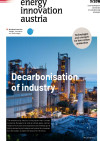
Ways to achieve a zero-emission industry. Innovation is the key for climate-friendly production.
energy innovation austria
3/2019
Herausgeber: BMVIT und Klima- und Energiefonds
Englisch, 12 Seiten
Downloads zur Publikation
Cooling Citites
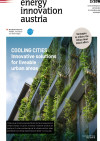
Innovative solutions for liveable urban areas
energy innovation austria
2/2019
Herausgeber: BMVIT und Klima- und Energiefonds
Englisch, 12 Seiten
Downloads zur Publikation
ZERMET - Zero Emission Retrofitting For Existing Textile Plants
Minimisation of the consumption of water, chemicals and energy in the textile industry. Further development of the ZERMEG approach in the form of a questionnaire and application in the textile industry.
ProKlim+ - Use of Model Predictive Control to optimize solar power consumption in case of increased energy efficiency.
Using weather forecast for building automation can help improving the energy efficiency of buildings and, thus, saving energy. In the project ProKlim+ the forecast of solar radiation will be used to optimize the building automation to satisfy the needs of the building users, and at the same time to minimize the energy demand on the one hand and to maximize the consumption of self-produced energy on the other hand.
CELL4LIFE - Reversible SOCs as a link between electricity, heat and gas networks to increase the self-sufficiency and resilience of neighbourhoods
A system consisting of a solid oxide fuel cell and a Machine Learning-based control system for increasing efficiency and minimizing degradation is being developed. As a link between all energy supply networks, the system is intended to increase the self-sufficiency and resilience of plus-energy districts.
INN'FIT4UM - Innsbruck "Fit4UrbanMission" - climate neutral Innsbruck 2030
Cities are the place where decarbonization strategies for energy, transport and buildings intersect. A few years ago, the municipality of Innsbruck set up a Smart City Group consisting of staff from the municipality, IIG, IKB and IVB to address this challenge. The goal of INN'F4UM is to develop a step-by-step plan to achieve climate neutrality for the city by 2030, building on an up-to-date representation of energy and resource flows together with the University of Innsbruck.
Verbreitung Von Biomasse Kleinanlagen In Österreich

Neue Entwicklungen Brennstoffversorgung mit Biomasse-Pellets
Forschungsforum
3/1998
Herausgeber: BMVIT
Deutsch, 6 Seiten
Downloads zur Publikation
Building innovations from Austria
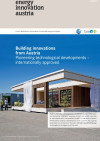
Pioneering technological developments – internationally approved
energy innovation austria
1/2017
Herausgeber: BMVIT und Klima- und Energiefonds
Englisch, 8 Seiten
Downloads zur Publikation
Renewable Heating and Cooling
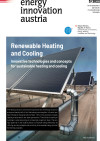
Innovative technologies and concepts for sustainable heating and cooling
energy innovation austria
3/2022
Herausgeber: BMK in cooperation with the Climate and Energy Fund
Englisch, 12 Seiten
Downloads zur Publikation
Bridging technologies on the way to a climate neutral future
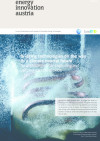
New strategies for capturing and utilizing carbon dioxide
energy innovation austria
4/2017
Herausgeber: BMVIT und Klima- und Energiefonds
Englisch, 8 Seiten
Downloads zur Publikation
Know-How-Plus - Options and constraints of building renovation towards plus energy building standard
Aim of this research project is to identify the realizable reduction potential of energy consumption and CO2 emissions by refurbishment of the Austrian building stock towards plus energy building standard. Furthermore a construction-oriented manual will be supplied for interdisciplinary planning.
Energy R&D 2022: Public Expenditures in Austria
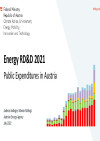
The public energy research expenditures amounted to 214.4 million euros in 2022, which is 9.6 million euros less than in the previous year.
Schriftenreihe
40/2022
A. Indinger, F. Bettin, M. Rollings
Herausgeber: BMK
Englisch
Downloads zur Publikation
Energy R&D 2021: Public Expenditures in Austria

The public energy research expenditures amounted to 224.1 million euros in 2021, thanks to the economic stimulus plan. This is the highest value so far and an increase of 44.4%.
Schriftenreihe
22/2022
A. Indinger, M. Rollings
Herausgeber: BMK
Englisch, 123 Seiten
Downloads zur Publikation
FiTNeS - Facade integrated modular Split-heat pump for new buildings and refurbishment
The goal of FitNeS was the development of modular split heat pumps with compact and silent façade-integrated outdoor units for heating and domestic hot water preparation (and optionally cooling in combination with PV). The outstanding features of the concept are a modular design with a high degree of prefabrication and representing a visually and architectonically attractive, economic and sustainable solution for both new constructions and renovations. One of the main development goals is the minimization of sound emissions by means of optimized flow control.
Pioneering industrial energy technologies
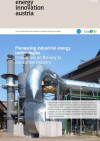
Innovations on the way to low-carbon industry
energy innovation austria
1/2018
Herausgeber: BMVIT und Klima- und Energiefonds
Englisch, 8 Seiten
